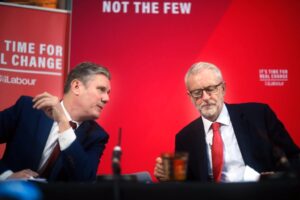It is a rare curse for a government to be forced to relaunch so soon after entering power. Yet with the Labour Party and its leader currently exploring new depths of unpopularity, the explicit aim of Starmer’s speech to conference was to arrest the sense of doom that has already settled. His rejection of “the weak and cowardly fantasy of populism” was more an admission that his government was already unpopular, and will soon become even more so, than a well-defined political philosophy. Instead, Starmer warned: “This will be tough in the short term.”
It will indeed, for him as well as us. Starmer’s triumphal entry in Downing Street was marred by the most serious bout of interethnic violence witnessed in Britain for many decades; now the sartorial acquisitiveness of his front bench has recast the self-proclaimed paragons of virtue in public life, in the public’s estimation, as money-dazzled chasers of goodie bags. As honeymoon periods go, it’s hard to think of a worse one since John Ruskin. Yet if Starmer’s grip on the country is already faltering, that on his party remains unchallenged. No wonder, then, that his opening victory speech ran triumphant laps around the vanquished Labour Left.
Though too unutterable a figure to name, Corbyn’s ghostly presence still loomed above the podium, in Starmer’s jibes against populism, and his self-applause for “rooting out [Labour’s] antisemitism”. Like a headmaster starting a new term, alluding to disruptive elements who have now thankfully been expelled, Starmer reminded the crowd that they were “only here because we changed the party”, rejecting the “the easier road to nowhere” of Corbyn’s economic populism. On the Middle East conflict that runs like a seismic faultline through the Labour Left, Starmer trod the sensible middle ground, repeating his long-delayed call for a ceasefire in Gaza, urging “a recognised Palestinian state” beside “a secure Israel” while issuing his “call again for restraint at the border with Lebanon” (though, at the time of writing, the warring parties have not yet taken heed). Here Starmer was fortunate, at least, that the heckling of a fresh-faced Gaza protestor, swiftly bundled outside, gave him a rare, if no-doubt long-rehearsed, opportunity to distinguish himself, and the party reshaped in his image, from the burning moral certainties of the grand old man he ousted.
Instead, Starmer redirected our gaze to the sunlit uplands of the unfortunately distant future, in a speech crammed with all the signifiers of Left-wing technocracy: promising “mission-driven” government with “progress displayed clearly”, pledging “five national missions” and a “10-year Plan for the NHS”. Metaphors of cosy domesticity and housebuilding were stacked on top of one another as Starmer promised a rebuilt Britain in the image of “a new home, a better home, built to last, built with pride” under “the Prime Minister from a pebble-dashed semi” (as he reminded us again). A capacious liberal Britishness is “stronger than bricks”, he assured us, just as “the brickies who rebuilt the broken walls of Southport” represent the best of British.
And so to Southport. The condemnation of the summer’s rioting, when it came, came carefully wrapped in a warning to the liberal Left not to conflate the Northern English jacquerie with “the millions of people concerned about immigration” — Starmer has “always accepted that concerns about migration are justified”, he assured us. Entirely correctly, he reminded the audience that controlled migration “is what people have voted for time and again”; and yet under Johnson and his successors, “the Tories gave them the exact opposite, an immigration system deliberately reformed to reduce control”. Will Britain’s rate of immigration now reflect the nation’s democratically expressed will, for the first time since Blair came to power? We shall see. Even as he sought the nation’s applause for returning false asylum claimants — here the conference crowd was more muted — he declared that “we can’t pretend that there’s a magical process that allows you to return people unlawfully without accepting that that process will also grant people asylum”. The principle has been accepted, it seems: now we are just haggling over the numbers.
Strikingly, in linking the Conservative Party’s vast acceleration of inward migration to “the uncontrolled market”, Starmer struck an unexpectedly Blue Labour-ish pose. In vowing a “levelling up of workers rights” and asserting that “taking back control is a Labour argument”, Starmer adopted the language of Johnsonian populism, even as he condemned the Tories for their emptiness in application. Finally getting into gear as the autocue wound towards the end, Starmer’s closing promise of “town centres thriving, streets safe, borders controlled at last” was a broadly conservative one, a vision of quiet, orderly prosperity rather than exciting new horizons: an essentially reactionary portrait of a country so recently lost, dangled as the prize of the future.
Yet the odds are against Starmer. Even as it promises an industrial renaissance in the future, Labour shows no signs of grasping the seriousness of Britain’s industrial crisis now, a far greater scandal — if of less interest to the Westminster lobby — than Lord Alli’s uncomfortable largesse. Similarly, as Germany’s botched energy transition shows, rising short term energy costs will poison the public’s acceptance of Net Zero goals long before the pay-off is ever reached. Labour’s still-ongoing attacks on Truss’s “unfunded budget” — a useful enough attack line at the time — seem to have trapped the party in a self-imposed austerity straitjacket, keener to be seen balancing the books now than subsidising the infrastructure necessary for a prosperous future.
It is here, then, that the high-stakes of Starmer’s gamble reveal themselves. His repeated assurances to voters that he understands their cynicism, that this time it’ll be different, are not an appeal to party loyalty as much as a last-ditch assurance that Britain’s political system still functions. “Yet look at our country,” he said twice, shaking his head — saying nothing more, because Starmer addressed a country that no longer functions.
The punchline of his final, carefully human-sounding anecdote was that if the householder he recently visited had known he was a politician, she’d have “kicked him down the stairs”. Starmer’s mission is not just to eke out Labour’s shallow victory but to re-enchant British voters with their political system in its entirety. And judging by the polls, so far Westminster’s Labour reboot isn’t working.
Disclaimer
Some of the posts we share are controversial and we do not necessarily agree with them in the whole extend. Sometimes we agree with the content or part of it but we do not agree with the narration or language. Nevertheless we find them somehow interesting, valuable and/or informative or we share them, because we strongly believe in freedom of speech, free press and journalism. We strongly encourage you to have a critical approach to all the content, do your own research and analysis to build your own opinion.
We would be glad to have your feedback.
Source: UnHerd Read the original article here: https://unherd.com/




